Mental Illness: Is Recovery Possible?

On Tuesday, October 20, 2015, The New York Times published the article: “A landmark schizophrenia study recommends lowering drug dosages and increasing therapy.” Dr. Eric Garland – an expert in biobehavioral research on psychotherapy – weighs in.
By Eric Garland, PhD, LCSW, Associate Dean for Research Associate Professor, University of Utah College of Social Work
Over the past several decades there has been an explosion of research demonstrating that our feelings and thoughts are closely tied to the function of our brains, so much so that the 1990s were heralded as the “Decade of the Brain” by the Library of Congress and the National Institutes of Health. Neuroscience has come to have a powerful influence on our concepts of mental health, leading many people to believe that the varieties of psychological suffering (such as the heterogeneous cluster of symptoms labeled “schizophrenia”) are caused by “biochemical brain imbalances.” While this view has removed a great deal of the stigma that was once associated with chronic mental health problems, it also may send the implicit and unfortunate message that change and recovery is not possible. If mental health problems stem from diseases of the brain, how can anyone possibly change their brain? Isn’t the function and structure of the brain, like any other organ, determined by genes and fixed from birth?
The answer emerging from neuroscience research of the past decade is an unequivocal “NO.” We now know that the brain grows and changes throughout childhood, adolescence, and even into adulthood and old age. A number of factors can stimulate changes in brain structure and function (known as neuroplasticity), including stress, diet, exercise, and even learning experiences. So, if chronic states of psychological suffering are partially the result of brain dysfunction (and, to be clear, a number of scholars have raised serious and important challenges to the neurobiological model of mental illness), many scientific studies demonstrate that learning and practicing new ways of thinking, acting, and responding to the challenges in our lives can change the way our brains function! Beyond changes in brain function, research is beginning to demonstrate that the very structure of our brains can be modified by mental training, not unlike the way people lift weights to build the size and strength of their muscles through physical training. Indeed, neuroscience research on cognitive behavioral therapy (CBT) and mindfulness-based therapies indicates that these forms of psychological treatment may restore healthy brain function and structure, and that these neurobiological changes are associated with improvements in clinical outcomes.
So what does all this groundbreaking and fascinating science mean for the idea of recovery from mental health problems? It explains how psychotherapies like CBT and mindfulness-based therapy can help people who have been diagnosed with a mental disorder to transcend their challenges and recover to live a healthy and meaningful life. The Substance Abuse and Mental Health Services Administration defines recovery as “a process of change through which individuals improve their health and wellness, live a self-directed life, and strive to reach their full potential” (SAMHSA, 2011). The latest neuroscience findings on neuroplasticity and results from clinical research on psychological therapies like mindfulness training and CBT provide strong evidence for the notion that recovery from mental health problems and substance abuse is possible. Time and time again, cutting-edge science and clinical findings reveal a simple, hopeful, and powerful truth: treatment is effective, and people do recover.
